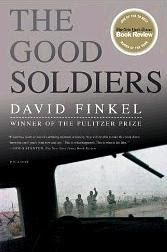
When I was a cadet, I studied under a French exchange officer who taught a two semester course called “Revolutionary Warfare”. He was a veteran of the battle of Algiers, a lieutenant in a parachute regiment. I don’t remember him sharing his experiences in any great detail, but vicariously, via four books, he shared more than I ever imagined. He and those books, the writers, shaped the way I see the world. I dip back into them often, for there are layers of perspective and detail, newness I seem to unearth with repeated readings. Reminds me of how Shakespeare’s plays have strata of meaning over time.
The Four books:
Street Without Joy by Bernard Fall (1961)
Hell in a Very Small Place by Bernard Fall (1966)
The Centurions by Jean Lartéguy(1963)
The Praetorians by Jean Lartéguy (1964)
David Finkel spent eight months with an infantry battalion in Iraq. He’s chronicled their year long deployment (April 2007- April 2008) in his book called The Good Soldiers. My Book Club is reading this book for our October gathering at the Central Library. While Finkel’s narrative is harrowing, it seems to me not harrowing enough over the 287 pages which includes pages cataloging every name of the battalion’s soldiers, pictures of the fourteen soldiers who died, and acknowledgements. There is no index. The book contains no footnotes.
This is a book for a wide range of audiences. Finkel, a 2006 Pulitzer prize winning journalist, commendably distances himself from the narrative and instead sketches for us the characters of experiences of soldiers of 2nd Battalion, 16th Infantry Regiment, principally the battalion’s commander. For the battalion, this book serves as a battle journal for posterity. The writer begins each chapter with a quote from President Bush. To me, it captures the distance and sometimes disconnect between the White House and in this case the tactical compound.
Despite Finkel’s fine work, I am not impressed.
I never met Fall or Larteguy, but in a way I did, over time. Those two writers gave me a deeper sense of many aspects of war and the people who fight them, the people who command them from afar. And most important, Fall and Larteguy taught me about consequences. Their observations lasted much longer than 8 months. These things take time.
Published in 2009, one year after Finkel's assignment, The Good Soldiers book is hasty pudding, really. I wonder if the battalion commander kept a diary? But these days we long for immediacy, fresh dispatches from front lines when we have the desire to change channels from X-Factor to the nightly news. America has a short attention span given the myriad of information choices. I invested a long evening with Finkel’s book and I’m glad I did.
His writing moves. He employs clear writing and the pages turned quickly for me. He names names and gets personal. War is very personal, in the end.
The body-armoured soldiers, riding in lightly armoured vehicles reminded me of the Battle of Agincourt…French armoured mounted knights riding downhill in a narrow field, hurtling, into the lightly armoured footsoldiers and bowman under the command of King “Harry”. Armoured knights falling beneath a steady rain of arrows from English longbowman, shining armour in the mud.
In the end, the battalion commander, flying away from his battalion’s compound, departing for America, muses, according to Finkel, that they’ve won. But the commander says he’s seen enough. I wonder what his enemies mused as they watched his helicopter drift slowly to the horizon? Finkel has a deadline for his book. 2-16 Infantry had a rotation date.
These things take time. I believe there are no winners, just the wounded and the dead. Despite what the battalion commander said often, “…it’s all good…”, it’s not good at all.
The Good Soldiers by David Finkel, Sarah Crichton Books, Farrar, Straus and Giroux, 2009.

No comments:
Post a Comment